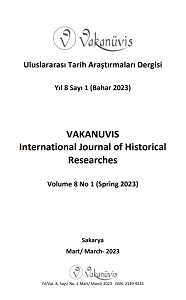Radical Atheism Towards The Orthodox Church In Montenegro, 1945–1960
Radical Atheism Towards The Orthodox Church In Montenegro, 1945–1960
Author(s): Aleksandar Stamatović, Budimir AleksićSubject(s): Christian Theology and Religion, Social history, Marxism, WW II and following years (1940 - 1949), Post-War period (1950 - 1989), History of Communism, Sociology of Religion
Published by: Serkan YAZICI
Keywords: Montenegro; atheism; church; Metropolitanate of Montenegro and the Littoral;
Summary/Abstract: The roots of radical atheism in Montenegro can be found at the beginning of the existence of the Yugoslav state in the interwar period. The Podgorica Assembly, which had the goal of formalising the unification of Montenegro with Serbia and other Yugoslav provinces, was held in November 1918. The Assembly proclaimed the decision to merge Montenegro with Serbia. Three members of parliament (MPs) came forward with radical atheistic requests at the Assembly, demanding that all the church’s property should be confiscated and handed over to the state. Some churches and monasteries were to be turned into public chapels for burials, and the others into schools and cultural institutions. During the interwar period, the Communist Party existed mostly illegally in Montenegro, and did not show any greater intent to impose radical atheism. During the Second World War, a strong revolutionary movement led by the Communist Party developed in Montenegro, as did also a counterrevolution. At that time the Communist Party and the partisan movement showed a strong degree of radical atheism, with elements of militant atheism, especially in the killing of a large number of church clergy (monks, priests and graduate theologians) during the war. However, the Communist Party did not implement radical atheism in the fields of ideology and the economy. It would do that only after the Second World War, when it assumed power over all spheres of social and public life. At that time, within the process of nationalisation and agrarian reform, significant material goods (buildings, land, forests and movable property) were taken away from the Orthodox Church in Montenegro. The same was done to the Catholic Church and the Islamic religious community. The process of radical atheism in an ideological sense took place parallel with this process. The intention of the Communist Party was to completely remove the church from social life, and implement atheism among the people, and practically turn them into believers of the new Marxist-Leninist ideology.
Journal: Vakanüvis- Uluslararası Tarih Araştırmaları Dergisi
- Issue Year: 8/2023
- Issue No: 1
- Page Range: 873-901
- Page Count: 29
- Language: English

